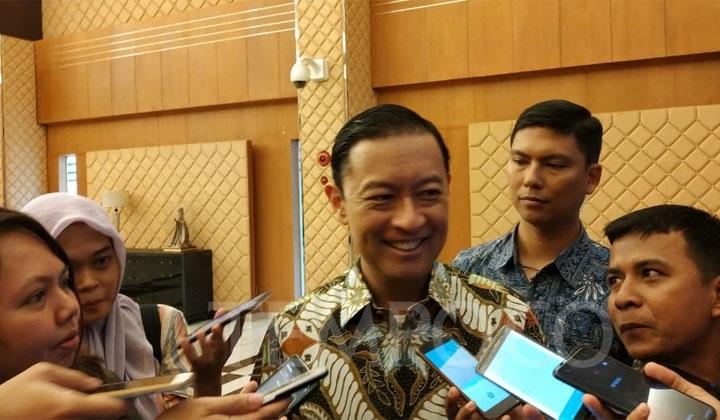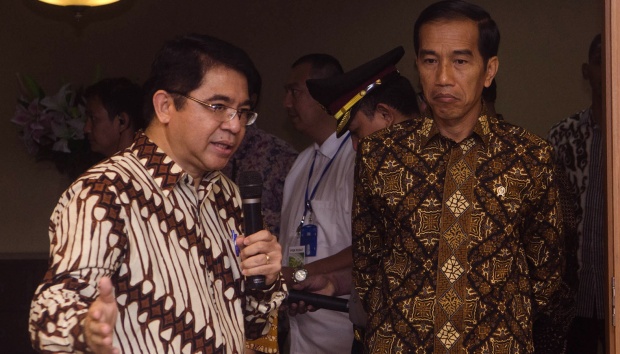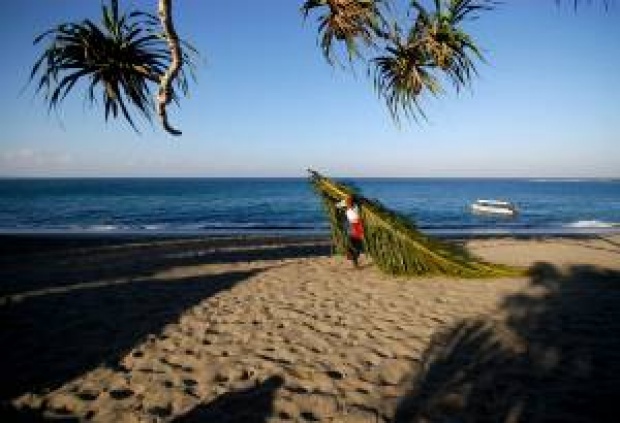BKPM Chief: Our Committee will Now Involve Labor Representatives
19 October 2018 21:53 WIB

In just one month as chairman of the Investment Coordinating Board (BKPM), Mahendra Siregar has had to face a couple of pieces of bad news. Last Thursday, members of the Indonesian Workers Union Confederation acted out their threat to hold a nationwide strike to demand higher wages. At almost the same time, the World Bank released the results of a survey on the ease of doing business in 189 countries. Indonesia placed four positions lower than previously, lagging behind its Southeast Asian neighbors.
The labor strike was carried out only by one labor union, because the All Indonesia Workers Union Confederation (KSPSI) and the Indonesia Prosperity Labor Union Confederation (KSBSI) refused to take part. Even so, in just one day of work stoppage the association of businesses reported losses of almost half a trillion rupiah. Mahendra could not ignore this turn of events. A few years ago, as the country grappled with the problem of limited infrastructure, labor had always been the positive point in the government's efforts to improve the investment climate.
So, he ended up going to the labor unions and talking to them, even though the problem was the domain of the labor minister. He also announced the formation of an investment committee which would include labor representatives. So far, the committee members tasked with assisting the BKPM chairman in formulating policies related to investment have only consisted of business representatives. "I believe the BKPM should not only deal with licenses but also other factors of interest to investors," said Mahendra.
Mahendra's job will not be an easy one. On top of domestic problems, the global economy continues to slow. This is one reason he is in no hurry to persuade big foreign investors to invest in Indonesia. He prefers to give BKPM a new role, with a new concept and that is to urge local investors to take advantage of the world economic slump by taking over foreign brands and to produce them domestically. "If we can do that, our problems would be solved. We will own everything," said Mahendra.
Last week, Tempo reporters met Mahendra at his office at the BKPM building. Below is part of the interview. The full version is available in print in this week's edition of Tempo English.
How do you view the current labor strikes demanding higher wages?
I think this is part of the dynamics of a democratic nation as big as Indonesia. So this problem must be analyzed and resolved. We cannot close our eyes to this problem or avoid it. We are not an authoritarian state.
Do you think their demands make sense, given the economic slump in the world as well as in the country?
I understand that the strike this time was supported by one particular labor union. Others opted not to take part, even stating they were ready to negotiate wages for next year. We have spoken directly with their bosses. I just find it unacceptable to force anyone who refuses to join the strike and I feel they must be supported in their right to work.
Are you personally involved in seeking solutions to the problem?
BKPM does not limit itself to handling licenses and other issues of interest to investors. Investment is also about labor, the environment and even about equitable development between the provinces. So, we don't just take care of investors, because if that is all we do, we will not understand the problem as a whole.
What concrete steps are you taking to solve the labor problem in the future?
We are currently reforming the investment committee, which is tasked with assisting the BKPM chairman in formulating policies or to analyze issues related to investment. This committee will not be the same as the previous one, whose members only comprised business representatives. We will involve environmental activists, labor union representatives and people who are experts on regional autonomy and the law, while business representatives will be reduced to two members.
Indonesia's competitiveness, as demonstrated by the World Bank survey, still lags behind its neighboring countries. What causes this?
The focus of that World Bank survey is on competitiveness and ease of doing business. In that context, if we look at it in a holistic way, especially from the problem of infrastructure, it will not be easy for Indonesia to improve its ranking. I believe this is something experienced by big developing countries. The challenge is to provide the infrastructure and improve the bureaucracy. And that of course is the government's work, our work.
How has investment been this year?
For the first time in history, investment in Indonesia during one quarter, i.e. July to September 2013, went beyond Rp100 trillion. So, in the last three quarters, we have realized 75 percent of the target. Interestingly, however, data indicate that in the last two quarters, domestic investment totaled half of foreign direct investment, and that comes to Rp33.5 trillion, to foreign investment total of Rp67 trillion. Of course, I cannot claim this as my doing.
What sectors attract investors?
The diversity of sectors has also gone through a transformation. When this country began calculating the investment realization figures in 2010, domestic investment favored primary sectors like mining. But in recent years, no investment increase was seen in this sector, and in fact, investment in the manufacturing sector continued to rise. Today, the situation has changed again. Graphs indicate an increase of investment in the services sectors, specifically tourism, telecommunication and electricity. So, from the investment angle, Indonesia is reflecting the economic pattern of a developed country, and that is changing from investing in the primary sector, to the secondary and then to the tertiary, which is services.
What about foreign investment?
Foreign investment seems to be going that way too. Investment realization on the primary sectors has stabilized at a certain level, and there is a sharp rise in the processing sector.
As the new head of BKPM what will you prioritize in the short term?
What we are pushing is to raise the value added to the upstream industries. So, the upstream industry would become midstream, like basic metals and basic chemicals. Also, the manufacturing industry must be able to become part of the global supply chain, not just be a supplier of domestic needs, subcontracted by foreign companies. In fact, I think it's time we go into branding.
What do you mean by that?
This is the chance for local companies to be shopping for brands. When other countries are in a slump, our private sector should be able to acquire their brands. Take their marketing network, their research, develop them then relocate their production base to Indonesia. This is what all countries are doing.























